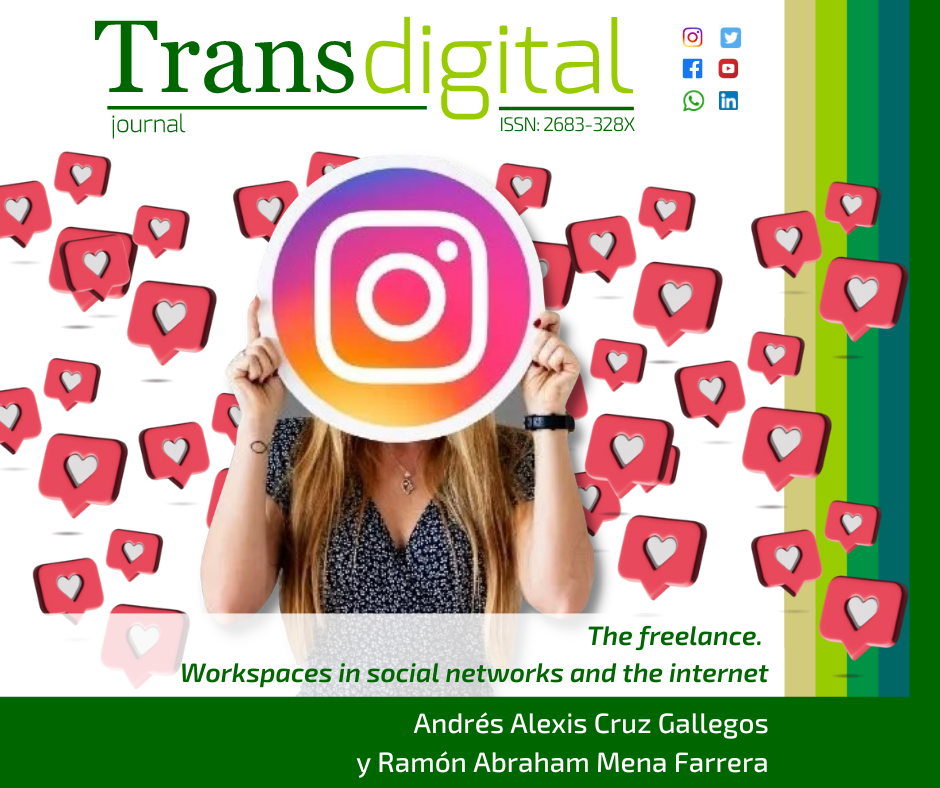The The freelance. Workspaces in social networks and the internetlance
DOI:
https://doi.org/10.56162/transdigital135Keywords:
Freelance, Instagram, internet, Mexico, Sociology of workAbstract
The long process of recurring crises and 30 years of application of the neoliberal model have made employment in Mexico precarious. This article exposes the results of an investigation carried out in and from digital spaces. From the theory of the sociology of work, the experience of work within the Internet was characterized and analyzed, where the impact of technologies and the creation of the digital was problematized in a rethinking of the labor and economic expertise of the human being. The professional activity and the technologies used by seven freelancers that show the change from the Homo videns model to the Homo navigator were analyzed. From a qualitative strategy and a phenomenological hermeneutic approach, we reflected on the knowledge produced, together with the interlocutors, in the logic of the reflexive production of data and the critical observation of phenomena. The article is a contribution to the understanding of technology at work, and the walking office, from where another form of payment and another way of life is experienced, on social networks, such as Instagram. This problematizes one of the global phenomena with the greatest impact on the youth who today work and live on this type of digital platform.
References
Asociación Mexicana de Internet (2019). Estudio sobre los Hábitos de los Usuarios de Internet en México 2018. https://soy.marketing/resultados-del-estudio-amipci-2018/
Borsook, P. (2002). Cyberselfish: A Critical Romp Through the Terribly Libertarian Culture. PublicAffairs.
Castells, M. (2004). La era de la información: economía, sociedad y cultura (Volumen I: La sociedad red). Siglo XXI Editores.
De La Garza, E. (2002). Problemas Clásicos y Actuales de la Crisis del Trabajo. En E. De la Garza y J.C. Neffa (comps.), El Futuro del trabajo, el trabajo del futuro, (pp. 12-31). Consejo Latinoamericano de Ciencias Sociales.
Forbes (14 de septiembre de 2018). Millennials ven difícil conseguir trabajo, emprender y hasta conseguir pareja. https://www.forbes.com.mx/millennials-ven-dificil-conseguir-trabajo-emprender-y-hasta-conseguir-pareja/
Forbes (30 de agosto de 2018). ¿Prefieres sexo o wifi? Tu respuesta dirá si eres millennial. https://www.forbes.com.mx/prefieres-sexo-o-wifi-tu-respuesta-dira-si-eres-millennial/
García, C. (2006). Las industrias culturales y el desarrollo de México. Siglo XXI Editores.
Giddens, A. (2010). Sociología. Alianza Editorial.
González-Pérez, M. A., & Percia, H. (Enero-junio de 2014). Gerenciando la Generación Y o el reto Millennials. AD-minister, (24), 7-8. https://www.redalyc.org/articulo.oa?id=322331212001
Islas, O. (2011). Los primeros años de Internet en América Latina. Razón y Palabra (76). https://www.redalyc.org/pdf/1995/199519981054.pdf
Islas, O. (2015). Cifras sobre jóvenes y redes sociales en México. Entretextos, 7(19), 1-16. http://entretextos.leon.uia.mx/num/19/PDF/ENT19-1.pdf
Medor, D. (2016). ¿Qué significa trabajar? Una aproximación a la visión de los freelance sobre la actividad laboral. Espiral, 23(67), 203-237. http://www.scielo.org.mx/scielo.php?script=sci_arttext&pid=S166505652016000300203&l nges&nrm=iso
Molinuevo, J. (2006). La crisis de los nómadas digitales. Taula: Quaderns de pensament, (40), 107-122. https://dialnet.unirioja.es/servlet/articulo?codigo=2476745
Osio, L. (Enero-junio de 2010). El Teletrabajo: Una opción en la era digital. Observatorio Laboral Revista Venezolana, 3(5), 93-109. http://www.redalyc.org/articulo.oa?id=219014912006
Ponce, N. (2008). Lo cualitativo como estrategia de investigación: apuntes y reflexiones. En J. Juárez, S. Comboni, & Mejía P. (Coords.), El arte de Investigar, (pp. 2013-231). Universidad Autónoma Metropolitana. https://publicaciones.xoc.uam.mx/Recurso.php
Rodríguez, D., & Arias, L. (Julio-diciembre de 2016). Legislación laboral y nuevas formas de Trabajo. Principia Iuris, 13(26), 11-34. http://revistas.ustatunja.edu.co/index.php/piuris/article/view/1134
Sanchis, S. (2013). La comunicación y las redes sociales. 3Ciencias, 1-9. http://www.3ciencias.com/wp-content/uploads/2013/01/comunicacion-y-redes-sociales.pdf

Downloads
Autor de correspondencia
El autor de correspodencia se identifica con el siguiente símbolo: *Published
How to Cite
License
Copyright (c) 2022 Andrés Alexis Cruz Gallegos, Ramón Abraham Mena Farrera

This work is licensed under a Creative Commons Attribution 4.0 International License.
All articles in Transdigital are licensed under a Creative Commons Attribution 4.0 International License. Authors hold the copyright and retain publishing rights without restrictions.









